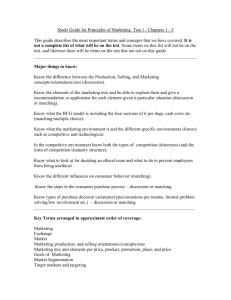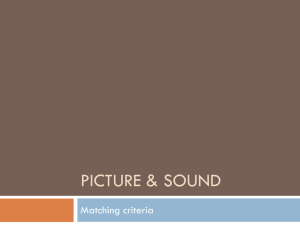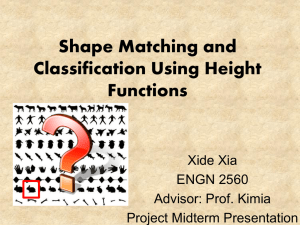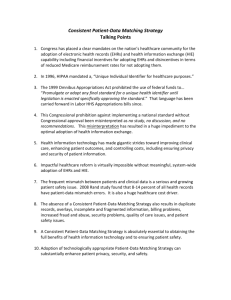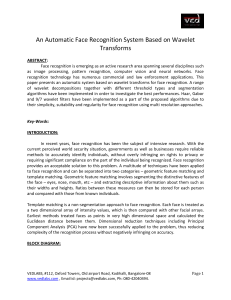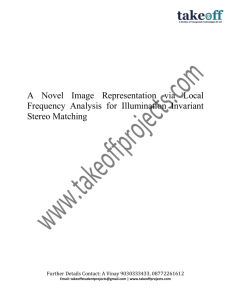RESEARCH ON THE MATCHING COLOR OF WEB MAPS
advertisement
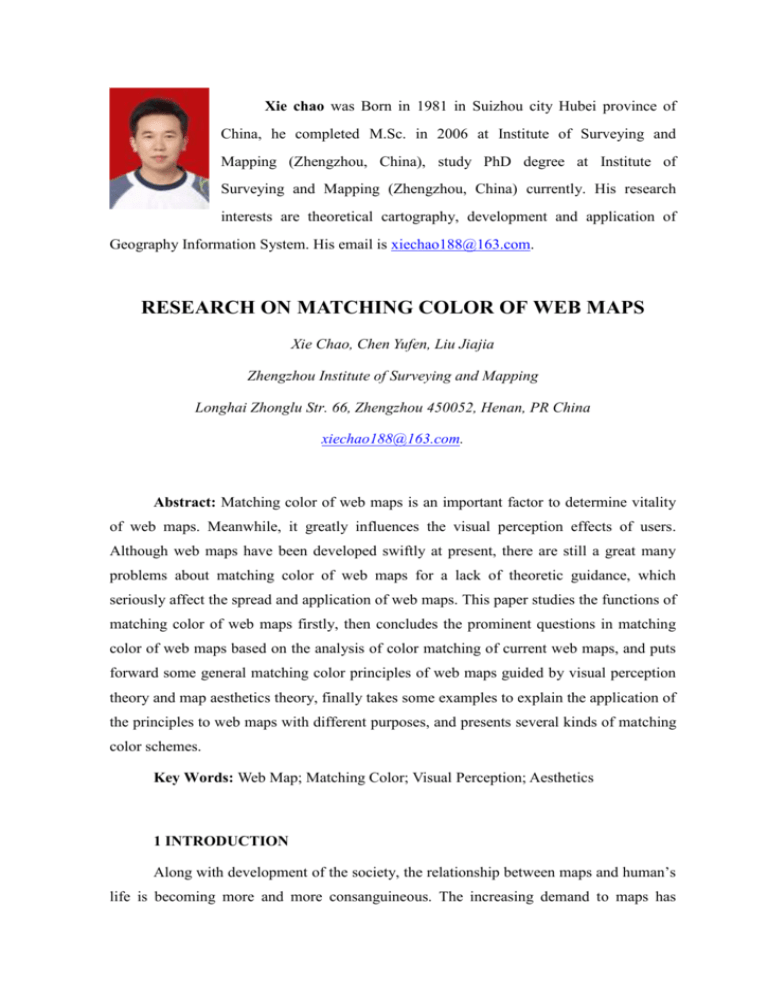
Xie chao was Born in 1981 in Suizhou city Hubei province of China, he completed M.Sc. in 2006 at Institute of Surveying and Mapping (Zhengzhou, China), study PhD degree at Institute of Surveying and Mapping (Zhengzhou, China) currently. His research interests are theoretical cartography, development and application of Geography Information System. His email is xiechao188@163.com. RESEARCH ON MATCHING COLOR OF WEB MAPS Xie Chao, Chen Yufen, Liu Jiajia Zhengzhou Institute of Surveying and Mapping Longhai Zhonglu Str. 66, Zhengzhou 450052, Henan, PR China xiechao188@163.com. Abstract: Matching color of web maps is an important factor to determine vitality of web maps. Meanwhile, it greatly influences the visual perception effects of users. Although web maps have been developed swiftly at present, there are still a great many problems about matching color of web maps for a lack of theoretic guidance, which seriously affect the spread and application of web maps. This paper studies the functions of matching color of web maps firstly, then concludes the prominent questions in matching color of web maps based on the analysis of color matching of current web maps, and puts forward some general matching color principles of web maps guided by visual perception theory and map aesthetics theory, finally takes some examples to explain the application of the principles to web maps with different purposes, and presents several kinds of matching color schemes. Key Words: Web Map; Matching Color; Visual Perception; Aesthetics 1 INTRODUCTION Along with development of the society, the relationship between maps and human’s life is becoming more and more consanguineous. The increasing demand to maps has stimulated the development of cartography profession, and all kinds of web maps have come forth like bamboo shoots in spring especially with vigorous development of the Internet. Today, web maps are widely spread. It is required not only to satisfy practical demand of people, but also to be capable of giving the reader a kind of beautiful feeling in the vision. However, the mapmakers often concentrate only on research of technical questions, without fully regarding aesthetic feeling problems of web maps. There are still many unsolved esthetics questions in web map design. Since the map designers often merely design depending on their own individual experiences , the quality of web map design is usually not high. Some web maps look like information storehouse, whose color design could not be tolerated by people. It can be said that web map design has fallen into ossification circumstance. If web maps don’t combine with the art, there would be no new vigor in them. Web map is a new kind of digital map product, which takes Internet as its transmission medium. It possesses characteristics of both the electronic map and the web, having abilities of long-distance map information transmission, convenient and wide dissemination and real-time dynamic renewal, strong man-machine interaction, fully using the hypermedia structure and so on [1]. But web maps are different from either the ordinary electronic maps or the general commercial websites. Besides the characteristics of the general website, web maps also have operational functions of the map. Therefore, as the main content of web map design, the matching color of web maps should be user-centered, and follow the visual perception theory and the map esthetics theory, so that web map could combine scientific aesthetics of the electronic map and artistic aesthetics of the website design. 2 FUNCTIONS OF MATCHING COLOR FOR WEB MAPS The cognition of color is the material phenomenon objectively existent, but the feeling of color is formed in the long-term practice, and the color has become the essential thing in our lives. People need maps with colors, while a map with an aesthetic and artistic feeling may not be successful without colors. Therefore the matching color of web maps seems extremely important. 2.1 Reasonable color matching may simplify symbol system of web map Web map expresses a lot of various objects and extremely rich content, which leads to the complexity of symbol system of web maps. Using the color can simplify the symbol system of web map, in which color variable substitutes for the graphic variable. Take an identical line for example, blue expresses water bound line, black is the road, and brown is the contour line, etc. Meanwhile, using different colors enables simple symbols express different objects respectively. Moreover, using symbols as simple as possible to represent abundant contents on web maps could increase the browsing speed of web maps. 2.2 Reasonable color matching may enhance aesthetic value of web maps A reasonable color matching of web maps could evidently enhance the representation ability of map language, which is highly beneficial to map reading and information transmission. Color is an active factor within the visual variables, changing whose attribute may produce many kinds of visual effects, such as associative perception, ordered perception, depth perception, etc. These effects can be applied to make it easier to identify the map elements and read the symbols clearly. 2.3 Reasonable color matching may give people an aesthetic feeling Color brings esthetical feeling to human beings, not only from the self attribute of each color, but even more from the combination and cooperation of different colors. By flexible structures, innumerable novel and harmonious visual effects may be created. So we could produce rich and colorful web maps by using constitutive ways of colors, such as contrast and unison, proportion and equilibrium, arrangement and rhythm, etc. so as to create esthetical feeling and stimulate reading interest for the readers [2]. 3 PROBLEMS IN MATCHING COLOR OF WEB MAPS Although web map is developing swiftly and violently at present, the relative lag in theory researches causes a lack of theory instruction to its color matching, and many phenomena that don’t adapt to the visual rules still exist. The problems in matching color of web maps mainly represent in following aspects: 3.1 Inharmonious color combinations Color is the first impression that maps present to us, and the first “information” that our eyes accept from the maps [3] . It can cause human psychological changes rapidly through vision. Therefore, matching color is the most headachy matter in map designing, but also the side that can show the level of map designing [3] mostly. If matching color of map lacks satisfactory, it would cause many problems, such as inharmonious colors, insufficient representation of content elements, difficulty in reading maps, and inferior artistic effects, which reduce the application value of the maps. 3.2 Color conflicts on interfaces The interface is the appearance of web maps and the layout of the basic contents on the homepage, which includes map area, map level control area, operation toolbar, legend, and so on. A friendly and artistic interface is very important to web maps. However, there are some problems color conflicts in matching color of web map interfaces, mainly representing that the background colors in different function sections are too close to distinguish; the contrast of colors between the foreground and the background in some tool frames is intense and dazzling. All the above is easy to cause visual weariness, influencing the overall effect of a web map. 3.3 Simplex color of symbols The map symbol is an indispensable medium as transmission tool of the map. It is the concrete manifestation form of map contents. The color design of map symbols is a key part in map designing, whose effect will directly affect the aesthetic feeling of maps. The symbol colors of some web maps are simplex, mostly in flat color, without fully displaying the charm of natural aesthetic feeling and the appealing sentiment of colors. 4 THE PRINCIPLES OF MATCHING COLOR FOR WEB MAPS In order to solve the above problems, we carried out an in-depth research on the visual perception theory and the map aesthetics theory, then summarized some general principles of matching color for web maps. 4.1 Consistency The correlative contents should be organized together in forms of function regions according to the principles of nearness, comparability and closeness within visual organization characteristics. The contents of web map could be distinguished by different colors and each position arranged reasonably and compactly, which makes the contents on the page unitary, and colors should be maintained consistent among different map homepages of an identical website, as well as different function regions of an identical homepage. 4.2 Symbolization Using accurately the symbolic meanings of colors refers to considering matching color organically to combine objective things and subjective feeling, functions of map elements, map objects and developing tendency of maps. For example, blue is accustomed to express the seas, rivers and lakes; brown to mountain land; yellow and brown are the natural colors to express the desert and Gobi’s, often connected with the non- vegetation’s dry area; the vegetation is expressed in green while the snow and ice region in royal purple, etc. The symbolic usage of matching color in web maps may be divided into two kinds as qualitative and quantitative ways. If neither of them follows symbolic custom of colors, it is possible to make readers confused, for example, to use the warm color to express January temperature of the north, or green to express the scarce vegetation of wilderness. 4.3 Rationality Matching color reasonably is an effective way to strengthen the expressive effect of web maps. Usually, a map is made up of three kinds of symbols, points, lines, and areas, which work together. The area symbol has the usual significance as background, with low saturation of colors, while the point and the line symbol are often used with colors of high saturation, which constitutes intense stimulation to make it easy for people to perceive. Based on this principle, using the changes of hue, lightness and saturation of color to display each kind of object’s quality, quantity, distribution scope and so on, thus we can enormously increase the load of map and make it simple and convenient to read. 5 APPLICATION EXAMPLES FOR MATCHING COLOR OF WEB MAPS The above are the general principles for matching color of web maps. In practice, there are different characteristics for maps of different purposes. Matching color of web maps must be selected and changed according to the concrete conditions. It should be considered roundly and analyzed seriously based on the subject content and concrete condition of different map sheets (or atlas), in order to unite the form of color matching and the content of map. The following examples are made to explain how to reach perfect effects with matching color of web maps. 5.1 City maps The city web maps are mostly large scale maps, involving map elements mainly as the settlement place, the roadway, the label, the water system, the vegetation, the abuttal boundary, the background, etc. The following is a list of the color-matching scheme of these primary elements, shown in Table 1. features settlement place hex French R235 #E G230 B220 yellow brown ring roa RGB grey super highway color R247 primary buff minimal white grey vegetation street an notation G251 B115 FFB73 R255 G255 B255 ated circle stri CB2CE #A 5CF94 G0 stri ated circle #9 R165 B0 stri ated circle FFFFF R156 R0 stri #F G207 B148 black circle #F G178 B206 green riated ated circle FDF4A R255 pea unst #F G223 B74 blue river 7BE21 R255 dway mark #F G190 B33 khaki road BE6DC re unst riated circle unst riated circle #00 Son 0000 g font in scenery point, lake bottle green R74 G106 B68 #4 A6A44 size 9 Restaur ant, mountain, gray station, R98 G98 B98 #62 6262 coporation office red R255 G0 B0 #F F0000 R39 blue railway and G114 B191 72BF white alternate with R255 G2 55 B255 Element point #27 #F FFFFF Mainly expressed by the vector symbols, with several bit map symbols Table 1. Color matching scheme of city web maps Figure 1 is a part of the web map produced based on the above matching color scheme. Figure 1. Matching color effect of partial picked picture The basic principles of matching color for city web map are: not to use dense color, and matching with some light, simple and elegant colors as far as possible, so that the user can feel comparatively comfortable when he reads the map, without feeling too dazzling. The area symbols do not need to be filled with point symbols, but to be distinguished with colors. In addition, the interface colors of electronic map ought to be mild and calm, not to choose extremely exaggerated contrast color. 5.2 Topographic map Influenced by the speed of Internet, topographic maps mostly appear as medium-scale or small-scale maps. The basic principle of matching color for this kind of map is simulating natural color of elements as far as possible, as well as considering the clear representation of elements and coordination of the overall colors. Table 2 shows the matching color scheme summarized by the author based on the research on matching color of topographic maps [4]. primary elements R G B 4 1 5 forest bosquet, springwood economy 7 03 6 crop woods vegetati on 8 shrubbery 4 1 grass land 00 paddy field river, 03 lake, reservoir 08 dam water system 20 passable swamp unable swampland brine pan 06 20 traffic 52 55 41 1 6 2 1 7 8 1 1 68 09 1 1 65 00 2 2 20 20 1 1 63 09 1 1 77 19 2 2 55 55 1 2 2 1 1 2 sand beach gravel 32 beach, gravel beach 20 rock beach 38 silt beach 31 sand-mud beach reef stone 41 street block 54 settleme nt place point 32 settlement place 40 railway super highway ordinary highway 55 carriage road county pathway soil texture sand flat 2 27 98 2 2 24 09 2 2 37 27 2 2 20 96 2 2 27 98 2 2 35 20 2 1 53 02 1 1 40 40 0 0 2 2 55 1 57 roadway simple highway 2 30 10 road, 33 27 07 1 1 2 2 1 1 2 1 1 0 0 7 3 2 2 30 30 1 1 10 10 2 2 19 94 2 2 14 75 2 1 1 1 sandlot full of hillocks 27 undulance sand upland 27 gravel terra, the desert 83 block terra salt-alkali terra small grass upland polygon ground snow land 04 48 01 24 18 2 2 14 75 2 2 14 75 1 1 68 28 2 1 97 78 2 2 41 23 2 1 85 44 2 2 11 76 2 2 23 40 1 1 1 1 2 1 1 2 Table 2. The matching color scheme of primary elements for topographic maps Figure 2 is a part of the web map produced with the above matching color scheme. Figure 2. The effect of partial picked picture 6 CONCLUSIONS All the above is the experience obtained by the author from the research on matching color of the web maps. It is hoped that this paper could give some help to those who are pursuing color research on web maps. To study matching color of web maps, it’s essential to pay more attention to observations and practices, to learn the characteristic of each kind of color, and then through deliberate comparison again and again, increasingly enhance the esthetic ability, and consequently achieve perfect effects of matching colors. References: [1] Zhang Dandan, Guo Qinsheng, Wang Lehui. A solution to browse information on electronic map in network [J].Journal of Geomatics, 2006, 31(3):40-42.(in Chinese) [2] Yu Liansheng. Artistic aesthetics and science aesthetics of cartographic[J]. cartographic,1990,(2):1-5. (in Chinese) [3] Jiang Nan, Cui Jifeng, Cheng Siqing, Xia Lihua. Research and practice on the cartographic Technique aesthetics in modern times [J]. Journal of institute of surveying and mapping, 2004, 21(4):298-301. (in Chinese) [4] Xie Chao. Research on the electronic topographic map symbol system[D]. Institute of surveying and mapping, information engineering university, 2006. (in Chinese) Biography: Xie chao was born in 1981 in Suizhou city, Hubei province of China. He received the M.Sc. degree in 2006 and is studying for PhD degree at Zhengzhou Institute of Surveying and Mapping (Zhengzhou, China) currently. His research interests are theoretical cartography, and development and application of Geographical Information Systems.
